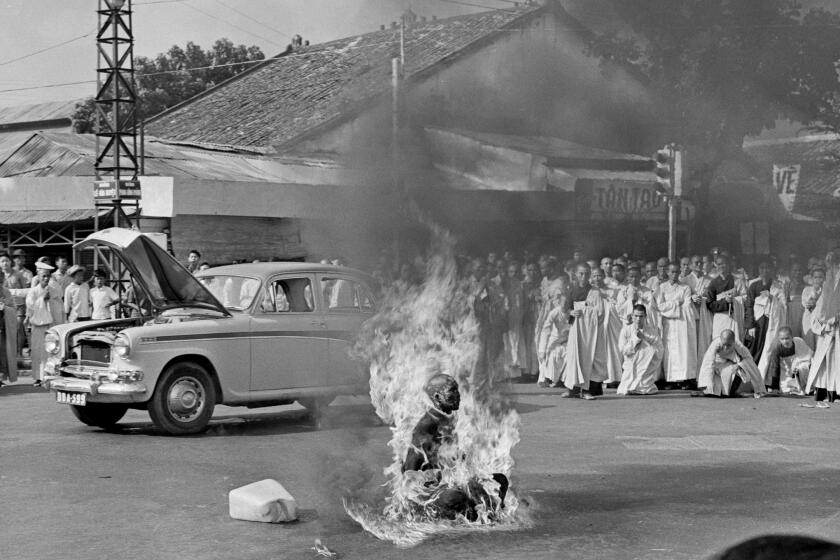Op-Ed: Sheriff Alex Villanueva is assaulting L.A. County’s jail abuse reforms

The Los Angeles County Sheriff’s Department is at a crossroads. Historic reforms that were instituted after the worst scandal in the department’s history are now under assault by our newly elected sheriff, Alex Villanueva.
The stakes could not be higher — for the sheriff, his department and the citizens of our county.
In the fall of 2011, county jails were embroiled in a criminal debacle characterized by a pattern of unconstitutional policing. Inmates, civilian monitors and even members of the clergy assigned to the jails signed affidavits testifying that they had either been victimized by, or witnessed violent and unprovoked physical attacks by, sheriff’s deputies.
Alex Villanueva can either get on board with the U.S. Constitution or get out of the way.
There was ample evidence that department personnel fomented division among prisoners that resulted in inmate-on-inmate violence, which was then used to justify violent interventions by jail deputies.
Conditions in the jails had so spiraled out of control that the FBI and the U.S. Department of Justice opened a comprehensive investigation into a jail system run amok. In response, Sheriff’s Department higher-ups attempted to frustrate these inquiries and cover up evidence of unconstitutional acts.
At the time, I proposed the creation of a blue-ribbon commission to investigate the root causes of the jail turmoil and to propose a fix. I believed this offered the best hope for restoring humane treatment and constitutional policing to our incarceration facilities and to the Sheriff’s Department as a whole.
The following week, the Board of Supervisors approved the creation of the Citizens’ Commission on Jail Violence, consisting of distinguished and experienced jurists, law enforcement officials and clergy.
The Citizens’ Commission returned a 600-page report that provided a road map for reform. Dozens of recommendations were made, including the establishment of an independent inspector general to oversee the department; a timelier and more transparent complaint-resolution process; swifter discipline for those found in violation of department policies; and cameras in the jails to help verify complaints. The underlying goal of the report was to establish a culture of constitutional policing, and consequences for those who wouldn’t acculturate.
In 2014, Jim McDonnell, who served on the Citizens’ Commission, was elected sheriff and tasked with implementing its recommendations. Many of the reforms have been implemented, and some are still a work in progress.
But the message was clear: There were institutional problems in the department that needed to be addressed, and there would be no turning back.
Not everyone agreed with this new direction, however, especially the union representing the deputies. Last year, it threw its support behind Alex Villanueva, who narrowly defeated McDonnell in November.
Since taking office, Villanueva has vowed to eviscerate these reforms. The current spat between the sheriff and the Board of Supervisors revolves around the reinstatement of a deputy who was discharged for allegedly engaging in domestic abuse against another deputy, who was also his ex-girlfriend.
The county’s Civil Service Commission upheld that discharge, but Villanueva has chosen to ignore that ruling by reinstating the deputy. It doesn’t stop there. Villanueva is contemplating the rescission of discipline that was imposed on multiple deputies by convening a “truth and reconciliation” panel, which is beginning to look more like a pardon exercise under the sheriff’s unilateral control.
Enter the Fray: First takes on the news of the minute »
At stake are three fundamental principles. First, law enforcement personnel must lawfully perform their duties. The most effective way to insure that is to hold them accountable when they don’t. When officers transgress enough to warrant discharge, and are then reinstated, it sends a dangerous message to the troops: “Watch what we do, not what we say.” This undermines the very credibility of the department’s stated expectations. That is unacceptable in our democracy.
Second, the sheriff is obligated to accept and respect civilian oversight. While he has significant powers, so do the Board of Supervisors and the Civil Service Commission. He is not a dictator and can’t assume powers that he doesn’t legally have. Making a virtue of flouting the county charter and its civilian governing body is something that even the most egomaniacal law enforcement chiefs — and we’ve had a few — would have thought twice about.
Finally, the sheriff and his subordinates must be faithful to their oath of office; to “support and defend the Constitution of the United States and of the state of California” and to “bear true faith and allegiance” to them. Villanueva recently asserted that the reforms that were instituted by the Citizens’ Commission are a “social experiment” gone awry.
The experiment to which he refers is the U.S. Constitution. He can either get on board with it or get out of the way.
Zev Yaroslavsky is a former member of the Los Angeles County Board of Supervisors and now teaches public policy and history at UCLA.
Follow the Opinion section on Twitter @latimesopinion or Facebook.
More to Read
A cure for the common opinion
Get thought-provoking perspectives with our weekly newsletter.
You may occasionally receive promotional content from the Los Angeles Times.






